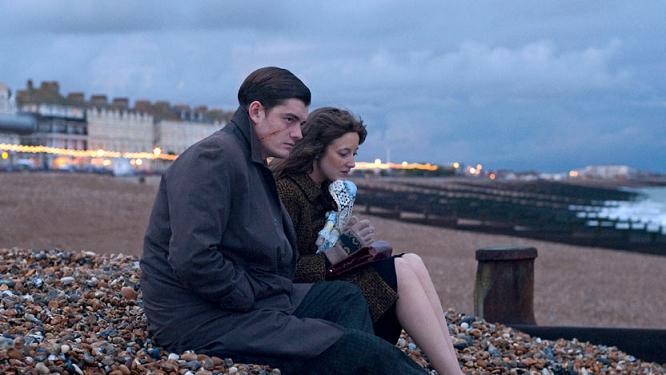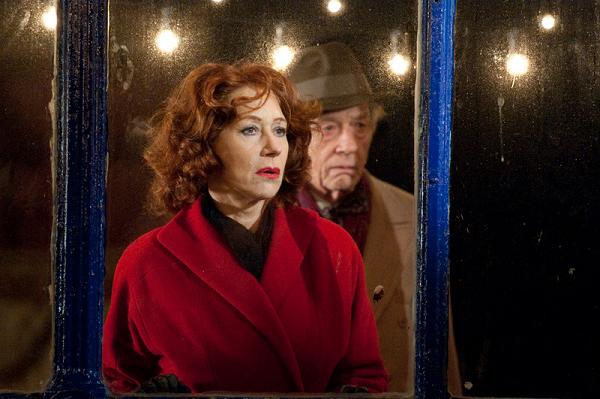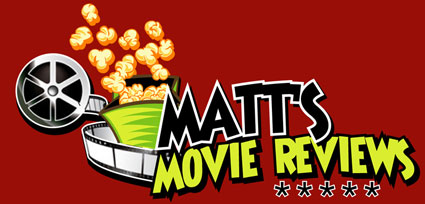Filmmaker Rowan Joffe has made his mark in more ways than one with his adaptation of Graham Greene’s classic novel Brighton Rock.
Not only did he have to contend with the foreboding shadow of the 1947 Boulting Brothers classic which has been lauded as one of the great British movies, but as the son of award winning director Roland Joffe (The Killing Fields, The Mission), Rowan has shaken off the weight of familial ties and stepped into the spotlight as a writer/director of considerable talent and defiant spirit.
Brighton Rock tells the story of Pinkie (Sam Riley), a razor blade wielding, sociopath teen gangster, whose lofty ambition to rule the seaside town of Brighton conflicts with his feelings for Rose (Andrea Riseborough), a mousy waitress who naively falls in love with him.
Although a screenwriter of ten years and director of two well received TV movies, Brighton Rock is the feature film directorial debut for Joffe. He took time out to talk to Matt’s Movie Reviews about the experience, as well his thoughts on censorship, critics, and happy accidents on set.
Enjoy!
Brighton Rock is your first feature film. How did the project come your way?
I’ve been writing feature film for about 10 years, and I was initially approached by Studio Canal to own the rights to the novel and to the original film, and was asked whether I would be interested in writing a remake of the 1947 Boulting Brothers classic, and my initial reaction was “No. I don’t like remakes and I wanted be interested in remaking a movie as significant as Brighton Rock”.
But it did prompt me to grab the book from my bookcase, the copy I still had from school. I re-read it, and I fell absolutely in love with the character of Rose. I went back to Studio Canal and said “Look, why don’t I just adapt the novel rather than try to remake the original movie?” They were fine with that. They particularly liked the idea of setting it in the sixties, because of the dilemma of whether you set it contemporary or do you set it in the thirties where the novel was set, and I think I came up with an interesting alternative to either of those, which I’m sure you’ll ask me about later.
But they were taken with the idea that I was able to say “You can only have my script, if I’m attached to direct”, and they took a punt on a first time feature director and I was lucky enough to have a go at it.
The Boulting Brothers original had to remove certain elements due to censorship. Does today’s more relaxed atmosphere towards violence and religion help in adapting a novel like Brighton Rock?
Well, it makes the novel worthy of a contemporary adaptation. In fact, it makes it almost more duty as a filmmaker if you love the novel, to bring it to life without the restriction of censorship. I mean, a lot of the Catholicism was cut out of the original film because they didn’t want to offend Catholics. The character Fred Hale, who is implicitly choked to death with a stick of rock is instead pushed off a ghost train, the fantastic falquric acid fight sequence on the cliffs at night at the end of the novel, again Pinky gets reduced to falling off the pier, which we’ve already seen once in the movie...I think if you really love the novel, there are aspects of the film where if critics were to be honest about, and few of them have been certainly in England, say the 1947 version is a rather tame adaptation and certainly fails to do justice to the character of Rose, because the original black and white was made is a period where we were very culturally and politically very patronising to women, and I think it is a patronising interpretation of that character you get in the black and white film.
 |
"Pinky's hatred for Rose is a very powerful emotion, but just as black clears the way for white, hatred clears the pages for the possibility of love." - Rowan Joffe |
The story was updated to 1964. What was it about that time which felt right for your adaptation?
It felt right because the book is about innocence and corruption, and I couldn’t think of a period in British history that wasn’t more obviously to do with the supposedly corrupting forces of youth violence, sexuality, the crumbling of that Church based morality, the sense that criminality was ripe...all of those things really came into being in the sixties, and they’re all elements that are absolutely central to the books.
When I thought of the sixties and realised it was the last year that the death penalty carried, it was the first time that youth had any political or cultural muscle, and indeed they flexed it on the beaches of England’s south beach coast, it was just like the novel was begging to be made in the sixties, and there was no good reason not to because Greene himself said, that of all of his novels it was Brighton Rock that was most inspired by imagination and least by the kind of cultural and political geography which he wrote it in, so I just went for it.
Nobody seems to be bothered by it, and a lot of people seem to get that it’s an exciting context to unfold Pinky’s story.
You had to re-cast iconic characters. What were your criteria in re-casting these characters?
I suppose the criteria in casting in any movie, which is striking a balance between name, big enough actors to satisfy the sales agents, and the integrity of your characters. There was no real conflicts between the two, because our big names are Helen Mirren and John Hurt, and I had always written the characters with those two actors in mind and was incredibly lucky to get those two in the movie.
With Pinky and Rose... obviously, Sam and Andrea are not anywhere near as accomplished as Helen or John, but they’re both up and coming, and I think are both genuinely exciting young actors whose previous work is really involving, interesting and original, with Sam in Control and I’ve seen Andrea in a number of TV and theatre pieces, and was very impressed by her. Carey Mulligan was originally attached to play the part of Rose, but her availability ended when she left to do Wall Street 2. But Andrea had always been a very, very close contender. In fact there was nothing in it, really. We were lucky that Andrea was still available, and now I can’t imagine any other actor playing that part as well.
I felt your Pinky was a much more conflicted character. Was than an intentional decision, or something which played out naturally?
You know what? “Conflicted” just might be the single best description that I’ve heard from a critic about the character. Yes he is conflicted, and he’s conflicted for the following reasons: his hatred for Rose is a very powerful emotion, but just as black clear the way for white, hatred clears the pages for the possibility of love. The Pinky of the book is a character who not only experiences sexual longing for Rose, but also emotion tenderness. It’s there, it’s on the page, it’s in the book... I don’t see that in Attenborough’s performance, and I don’t understand why it has never been criticised for lacking that dimensionality, because without it Pinky is a reptilian, unfeeling, psychopath incapable of human feeling.
And it that is the character, which it isn’t, then you have to ask the very simple question: Why doesn’t he just kill her?
 |
"Graham Greene himself said, that of all of his novels it was Brighton Rock that was most inspired by imagination and least by the kind of cultural and political geography which he wrote it in." - Rowan Joffe |
You do some interesting things visually. Did you storyboard the movie?
Yeah...my storyboards are rather sort of odd things. I usually get very distracted by conventional storyboarding, and spend ages on each frame. That tends to be in the beginning of pre-production when I’ve got more time. Then as we get closer to the shoot and I don’t have time to do anything, let alone sleep or eat, I tend to do aerial plans that basically just show you what you want from your camera position, and how you will logistically place your actors.
That became very important in the riot sequence, and also in the scooter invasion just before the riot, because then as a director you are almost having to plan a sort of mock battle, and we shot that entire sequence in almost two days, including all the way from the mob arriving to the end of the riot, and that’s a very tight time frame to shoot something like that because we were a relatively small budgeted movie, but we wanted to feel like a big movie and that’s thanks to John Mathseon, our director of photography who is used to shooting big movies, especially for Ridley Scott. This feels much bigger than your average Brit flick.
A scene that stayed in my mind was the wedding scene, where you had Rose bathed in light, while Pinky was in darkness. Was that an interpretation to the moral and spiritual nature of these people?
You know what, I would love to say with my hand on heart that it was, but actually it was just an accident of the lighting. I remember talking to John Matheson on the set while we were shooting that and saying, “Bloody hell, John! Rose is a bit hot in this”. (laughs) He kinda looked down the lens and said, “Yeah. But I like it!”
So it stayed in, and it was only during the cut when it was too late to do anything about it that I decided that it reflected the moral innocence of Rose, and the moral corruption of Pinky. But I’ve got to be honest and say that it was a fluke (laughs).
Well, it was a good accident! You also adapted the script for The American. Both films are similar that they feature main characters that are stone cold killers, and Catholic features of sin and redemption. Did you also see the similarities between both films?
It is funny...I had written The American just after I had written Brighton Rock, and it’s based on a novel by Martin Booth called “A Very Private Gentleman”, and I never really understood the novel or I understood why I liked it until I realised that it’s a story about a killer incapable of human relationships, who ends up being redeemed by the possibility of love. It was when I realised that when I got a handle on the script.
I didn’t pick the projects aware of the similarities, but became aware of them as I was developing them side by side. I know The American got slammed in Australia...
Not by me...
...it’s not everybody’s cup of tea, but it’s got a very particular pace to it, so you either like it or you don’t. |
